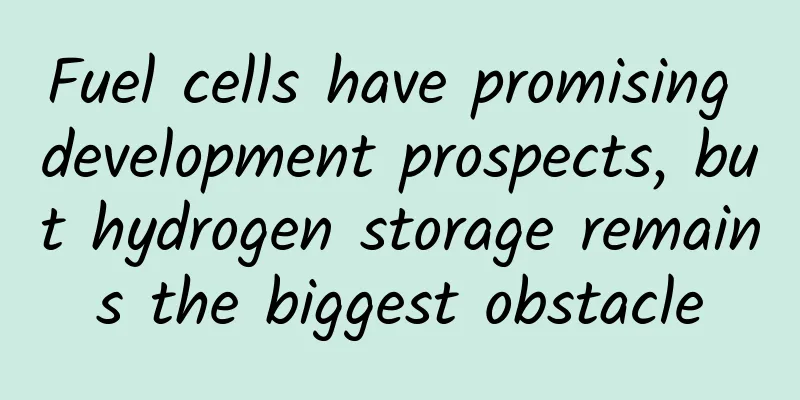Fuel cells have promising development prospects, but hydrogen storage remains the biggest obstacle

|
Since 2017, the fuel cell industry has begun to develop at a relatively fast pace. Companies such as BMW, Daimler, GM, Volkswagen, Toyota, Honda, and Hyundai have all launched fuel cell vehicle products. At present, pure electric vehicles are the main development route for new energy vehicles in my country. However, the "Automotive Industry Investment Management Regulations (Draft for Comments)" issued in May this year stipulates that pure electric vehicle investment projects include pure electric vehicles, extended-range pure electric vehicles, fuel cell vehicles and other investment projects. In other words, fuel cell vehicles remain an important technical direction for the development of new energy vehicles in my country. Fuel cells are more like internal combustion engines than power batteries. Hydrogen fuel cells are highly efficient and use reversible electrolytic chemical reactions to generate electricity. This method of generating electricity is more environmentally friendly, and the only products are electricity, water and heat. In the future, fuel cells are expected to replace most fuels and some batteries. There are still many problems for fuel cells to achieve industrialization. For example, the cost of hydrogen fuel cell stacks still needs to be further reduced and the service life needs to be increased; the cost of hydrogen production, transportation and refueling is still high. Due to the above problems with fuel cells, their application scenarios in the short term are trucks and buses for fixed-point transportation. The byproduct of the petroleum industry is mainly hydrogen-containing tail gas, which is currently the main source of hydrogen. Currently, hydrogen is produced by cracking coal or natural gas, which has low energy consumption, acceptable cost and considerable production capacity. However, the use of renewable energy such as solar energy, wind power and hydropower to produce hydrogen is environmentally friendly, but the cost is too high. By using hydrogen-containing exhaust gas and fossil energy to produce hydrogen, both the production capacity and production cost can meet the large-scale development of fuel cell industrialization. The biggest obstacle to the use of fuel cells is the storage of hydrogen. Hydrogen is a gas that takes up a lot of space when stored and has high requirements for storage devices. Currently, some companies are transporting hydrogen in the same way as ammonia. Fuel cell technology is still developing and there are still many challenges before it can be put into commercial use. In the future, fuel cells are expected to become an alternative solution and be used in many fields. As a winner of Toutiao's Qingyun Plan and Baijiahao's Bai+ Plan, the 2019 Baidu Digital Author of the Year, the Baijiahao's Most Popular Author in the Technology Field, the 2019 Sogou Technology and Culture Author, and the 2021 Baijiahao Quarterly Influential Creator, he has won many awards, including the 2013 Sohu Best Industry Media Person, the 2015 China New Media Entrepreneurship Competition Beijing Third Place, the 2015 Guangmang Experience Award, the 2015 China New Media Entrepreneurship Competition Finals Third Place, and the 2018 Baidu Dynamic Annual Powerful Celebrity. |
<<: “Killing” live streaming: the rapid loss of control of a “trend” and the capital trap
Recommend
The application of gamification thinking in community operations!
In the previous article "What is the specifi...
Shared bicycles are so popular that power banks are also joining in the fun. Why are Tencent and Xiaomi investing hundreds of millions but being ridiculed by Wang Sicong?
With the emergence of shared bicycles, the "...
Methodology: 99% of brands have poor product selling points
Through this article, you will have a very system...
Please don’t step on the grass! Is it okay to step on the grass?
Produced by: Science Popularization China Author:...
up to date! Data rankings of 56 information flow advertising media platforms!
The following is the latest traffic rankings of 5...
What does it mean to be in a family where only one child has died? What is the standard for assistance to families with a deceased only child in 2022?
Recently, the Ministry of Finance issued the &quo...
Learn ASO from scratch: 10 minutes to learn the basic methods of ASO
Introduction: ASO , which is the abbreviation of ...
Soul and Tantan product analysis
With the continuous development of the Internet e...
In-depth analysis of Android dynamic management fragment: "Do you know these components?"
1. The relationship between Fragment and Activity...
How Li Jiaqi and Perfect Diary use WeChat private domain traffic
The current first-line live-streaming influencers...
What is the difference between the 5G millimeter wave exclusive to the US version of iPhone 12 and the domestic version?
This year's iPhone 12 has returned to the old...
The complete collection of The Legend of the Dragon Slayer comics is free: How to make the website HTML code more in line with the SEO structure?
The web pages that ordinary people see are organi...
Apple and Google team up to track the spread of the epidemic using iPhone and Android apps
Apple and Google announced a partnership on Frida...
my country's first million-ton offshore carbon dioxide storage project put into operation
Reporters learned from China National Offshore Oi...
B station product analysis!
At the just-concluded 9th China Internet Audiovis...









